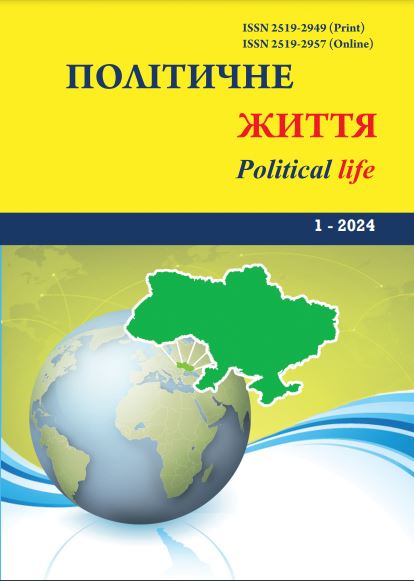Sense of ownership and newly occupied territories
DOI:
https://doi.org/10.31558/2519-2949.2024.1.20Keywords:
International Law; Sense of Ownership; Cyprus Question; National Identity; Russian-Ukrainian disputes; Uunrecognized entities; Violations of International LawAbstract
This scientific article delves into the intricate dynamics surrounding the concept of "Sense of Ownership" within the context of newly occupied territories in the field of Political Sciences. As the global landscape continues to witness territorial changes, this study aims to unravel the psychological, social, and political dimensions that underlie the development and impact of a sense o ownership among diverse stakeholder groups.
The research employs a multidisciplinary approach, integrating insights from psychology, sociology, and political theory to comprehensively explore the factors influencing the formation of a sense of ownership in populations affected by territorial transitions. Drawing upon case studies from historical and contemporary geopolitical events, the article analyzes the role of identity, historical narratives, and international relations in shaping individuals’ and communities’ perceptions of ownership over newly acquired territories.
Furthermore, the article investigates the implications of a heightened sense of ownership on state-building processes, governance structures, and conflict resolution strategies in the aftermath of territorial changes. By synthesizing theoretical frameworks and empirical evidence, the study contributes to a nuanced understanding of the complex interplay between human psychology, societal dynamics, and political outcomes in the context of territorial acquisitions.
The findings of this research have significant implications for policymakers, scholars, and practitioners involved in addressing the challenges associated with newly occupied territories. By illuminating the multifaceted nature of the sense of ownership, this article seeks to foster a more informed and nuanced approach to the management and resolution of conflicts arising from territorial changes, ultimately contributing to the broader discourse on stability and peace in international relations.
Objective of the study: To provide an extensive report of the topic of affected people in conflicts who are subjected to their sense of ownership and belonging foundations being challenged; to propose, substantiate and introduce the notion of correlation between national identity and areas of disputed geographical entities prior, during and after a geopolitical conflict occurs.
Methodology: With the help of emphasizing on complex historical events which describe the existence of disputed geographical entities, in which the substantial protection of human rights is threatened by aiming to disrupt the foundations of national identity for the affected social groups, and create the foundations of national identity for the social group that will be established in the geographical entity, often constituting the invading social group.
Results and Conclusions: To demonstrate that global institutions for functions affecting unrecognized entities have little effect on supporting the affected social group when the invading social group is able to not adhere to the policies it doesn’t support, thus the increase in the number of stateless individuals who suffer what they must. It has been concluded that the status of geographically disputes areas can be considered stable when the protection of human rights is guaranteed and a social group’s sense of ownership isn’t disputed, either by the entities involved, or by third party entities.
References
Liousis, N., Dalis, S. (1999), International relations in the post-Cold War era, from geopolitics to geoeconomics and the challenges of the 21st century, Papazisis Publications, Athens, 1999
Kouloumbis, T., Wolfe, J. (1981) Introduction to International Relations, Power and Justice, Papazisis Publications, 1981, pp. 127- 128
Kissinger, H. (2002). USA, Empire or Leading Power? For a diplomacy of the 21st century, Livanis Publications, Athens 2002, p. 15, p. 251
McMahon R.J., (2021). The Cold War: A Very Short Introduction. 2nd Edn. Oxford University Press, pp. 1-5, pp. 14-15
Huntington, S.P. (2014). Who are we?: The challenges to America’s national identity. Simon and Schuster, 2014. p. 32
James, A. (1998), “The Making of the Cyprus Settlement, 1958–1960,” The Cyprus Review
Polyviou, P. (2010), The Diplomacy of Invasion, The Geneva Conference on Cyprus in August 1974, Athens, Kastaniotis Publications.
Loucaides, L. G., (2011). “Is the European Court of Human Rights Still a Principled Court of Human Rights After the Demopoulos Case?”, Leiden Journal of International Law, 24 (2011), pp. 435–465
Giddens, A. (1991). Modernity and Self Identity. California: Stanford University Press, p. 53
Lacan, J. (2006), The Mirror Stage as Formative of the Function of the I as Revealed in Psychoanalytic Experience. pp. 97-100
Bloom, W. (1990). Personal Identity, National Identity and International Relations. Cambridge: Cambridge University Press, pp. 75-83
Miller, D. (1988). The Ethical Significance of Nationality. Ethics v. 98.
Anderson, B. (1991). Imagined communities, Reflection on the Origin and Spread of Nationalism. London: Verso Anderson, pp. 5,6,7
European Court of Human Rights. (1995). Case of Loizidou v. Turkey (Preliminary Objections). https://hudoc.echr.coe.int/fre#{%22itemid%22:[%22001-57920%22]}
Council of Europe. (1994). Protocol No. 11. To the Convention For the Protection of Human Rights and Fundamental Freedoms, Restructuring the Control Machinery EstablishedThereby. https://www.echr.coe.int/documents/library_collection_p11_ets155e_eng.pdf
European Commission of Human Rights. (1993). Chrysostomos and Papachrysostomou v. Turkey. https://hudoc.echr.coe.int/app/conversion/docx/pdf?library=ECHR&id=001-45670&filename=CHRYSOSTOMOS% 20AND%20PAPACHRYSOSTOMOU%20v.%20TURKEY.pdf&logEvent=False
European Court of Human Rights. (2001). Case of Cyprus v. Turkey. https://hudoc.echr.coe.int/Eng#{%22itemid%22:[%22001-59454%22]}
Khmeleva. I., (2019). Protection of human rights in the territories of unrecognized geopolitical entities: international law analysis. International law and International Relations. European Political and Law Discourse, 2019, 6(2), p. 8
Legal Consequences for States of the Continued Presence of South Africa in Namibia (South West Africa) notwithstanding Security Council Resolution 276 (1970) [1971]. ICJ. https://www.icj-cij.org/files/case-related/53/053-19710621-ADV-01-00-EN.pdf

